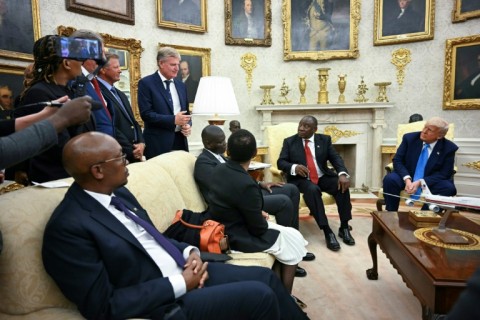Trump challenges South African president in Oval Office over claims of 'white persecution - The Zambian Observer
After months of tension, the moment has arrived for U.S. President Donald Trump and South African President Cyril Ramaphosa to meet in the Oval Office. The two leaders are engaging in high-stakes discussions aimed at addressing their differences and mending the strained relationship between their countries.
This meeting comes on the heels of a heated confrontation between the leaders, where Trump confronted Ramaphosa with videos and articles he claimed demonstrated a “genocide” against white South Africans. The confrontation escalated as Trump demanded Ramaphosa provide proof that such an atrocity wasn’t occurring.
The Oval Office meeting itself was described as relatively calm, with both leaders offering pleasantries, but a notable moment occurred when Trump asked Ramaphosa what it would take to convince him that no such “genocide” was happening. In response, Trump directed his staff to play a video that included footage of Julius Malema, leader of the Economic Freedom Fighters party, calling on his followers to “kill the farmer” and “kill the Boer.”
Ramaphosa responded by explaining that Malema, though a member of parliament, holds no government authority and represents a small minority within South Africa’s multi-party democracy. He emphasized that Malema’s views, which contradicted government policy, were not reflective of the nation’s stance.
South Africa’s Agriculture Minister, John Steenhuisen, then acknowledged the severity of farm-related violence, emphasizing that it would require significant effort and resources to address the issue. He also assured Trump that the majority of South Africa’s farmers, both commercial and smallholders, were committed to staying in the country and continuing their work.
In a passionate defense, Steenhuisen rejected Malema’s rhetoric and explained that his party, the Democratic Alliance, had teamed up with Ramaphosa’s African National Congress (ANC) to prevent Malema’s party from gaining power. He stressed that maintaining this alliance was crucial for protecting the country’s future.
The meeting between Trump and Ramaphosa, arranged at the request of the South African government, takes place amid ongoing controversies, particularly surrounding South Africa’s land expropriation laws. Trump has frequently voiced concerns about the alleged mistreatment of white South Africans, echoing the white supremacist conspiracy theory that immigration and forced assimilation threaten the survival of white people. These claims have fueled racial tensions and have been linked to conspiracy theories such as the “great replacement” theory.
Trump has used the land expropriation debate to criticize South Africa, claiming that the government’s efforts to address apartheid-era inequalities equate to anti-white discrimination. South African officials have argued that Trump’s rhetoric, which is often based on the claims of white Afrikaners, undermines their country’s legal efforts to seek justice on the global stage, particularly in relation to a case against Israel currently before the International Court of Justice.
In February, Trump took the step of cutting U.S. aid to South Africa, citing the government’s land policies and accusations of mistreatment. He also authorized the granting of asylum to a group of white Afrikaner farmers, an exception to the U.S. refugee admission freeze.
Arriving in Washington with the intention of easing tensions, Ramaphosa sought to reset the bilateral relationship. His delegation included prominent South African golfers Ernie Els and Retief Goosen, both personal friends of Trump, as well as billionaire Johann Rupert, who is influential in the luxury goods sector.
At the start of the meeting, President Cyril Ramaphosa made it clear that his goal was to “reset” the relationship between the U.S. and South Africa, stressing the importance of their long-standing partnership in areas like trade, energy, and space exploration. He noted that it was critical to advance mutual trade and investment, hoping to foster a stronger economic relationship moving forward.
Despite the tensions, the presence of Els and Goosen seemed to calm the room. When asked to weigh in, Els spoke as a proud South African who wished to see his country prosper. He emphasized the positive work being done in sectors like farming and local infrastructure, adding that American support was crucial for these efforts to succeed.
Rupert, also speaking from his perspective as a South African business leader, echoed the need for international assistance, particularly in addressing the widespread crime affecting all races in South Africa. He called for more resources and technological support to help combat the growing problem.
President Donald Trump, visibly moved by their comments, expressed admiration for the two golfers and remarked on the difficulty of their careers. He praised their accomplishments and reflected on the importance of having strong leaders who are dedicated to their country’s future.
The meeting, which included moments of tension but also opportunities for dialogue and reflection, highlighted the ongoing challenges in U.S.-South Africa relations. It remains to be seen whether the discussions will lead to meaningful progress in resolving the issues that have divided the two nations.







